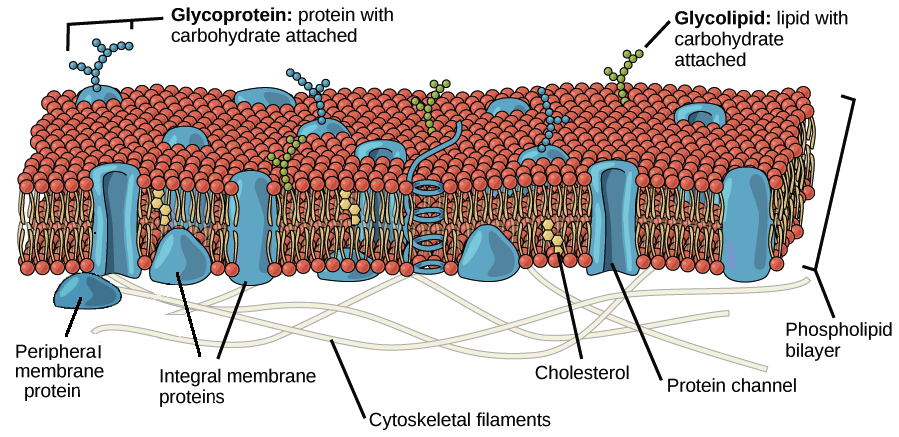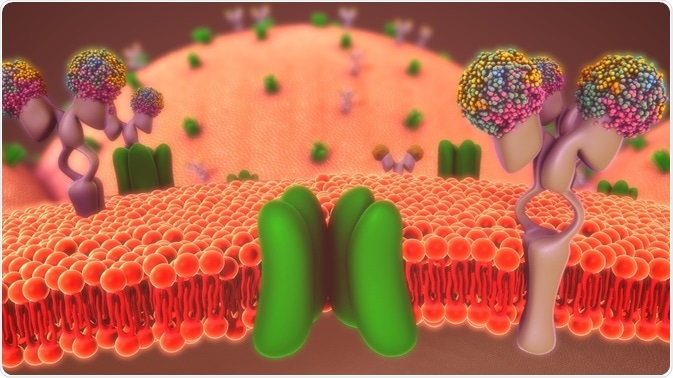Describe the Diverse Role of Proteins in Membranes
Intrinsic proteins embedded in cell surface membrane with attached carbohydrate chains. Each type of membrane protein has a different function.

Structure Of The Plasma Membrane Article Khan Academy
The functions of a membrane protein include cell cohesion relaying signals between the inside and outside of a cell and transporting proteins across the membrane.

. Cell adhesion cell signalling - act as receptors for chemical signals Phospholipid Phosphate head and 2 fatty acid tails. The basic function of at least one part of every integral protein is to attach the protein to a plasma membrane. Provide shape and structure to the cells.
These proteins allow for cell recognition eg recognition of specific proteins by antibodies Signal transduction - Some of the proteins are involved in cell signaling which allows the cell to respond. Cytoskeleton constituting the actins. Like CHANNELS PUMPS acts in transport across membrane depending on their gradient.
ECM Extracellular matrix Junctions. In signalling pathway they act like RECEPTORS 2. The cell membrane proteins perform so many functions some are.
Choose one from among the parts which you want to become. Membrane-embedded transporters move ions and larger solutes across membranes receptors mediate communication between the cell and its environment and membrane-embedded enzymes catalyze chemical reactions. Up to 256 cash back Proteins perform many roles in cells.
Transmembrane proteins go across the whole membrane while integral membrane proteins dont have to. Some of membrane enzymes also present and perform many activities for exampleoxidoreductase. They act as markers - Some of the proteins in the cell membrane act as markers allow for cell recognition.
Enter into the cell. Have a high affinity to water thereby allowing other important molecules. Eldra Solomon Charles Martin Diana W.
Proteins are organic substances found in cells which produce pores which. Draw your model of a cell membrane label its parts and give their functions. Form bilayer can mover around each other Cholesterol Lipid with hydrophilic and hydrophobic end.
It is the proteins therefore that give each type of membrane in the cell its characteristic functional properties. This irregular distribution of membrane proteins is known as membrane asymmetry. Structural proteins help to give the cell support and shape.
They can be classified as either transmembrane proteins or integral membrane proteins. Accordingly the amounts and types of proteins in a membrane are highly variable. The role of proteins in membrane structure and transport of molecules.
These proteins can be receptors which work as receivers of extracellular inputs and as activators of intracellular processes or. Across the membrane include the production of hydrophilic pores to aid. The autophagy pathway builds de novo a membrane organelle the autophagosome.
Proteins in the cell membrane can have many roles. In the myelin membrane. They are present on the outermost cell wall as well as the nuclear envelope which surround the nucleus and binds the DNA.
They have a range of important functions. Membrane proteins mediate processes that are fundamental for the flourishing of biological cells. Which of the following in a role you would NOT expect for proteins.
Intrinsically disordered proteins and protein regions IDPsIDPRs are mainly involved in signaling pathways where fast regulation temporal interactions promiscuous interactions and assemblies of structurally diverse components including membranes are essential. 7 rows Transmembrane proteins perform most of the functions illustrated here. This membrane may be the plasma membrane surrounding the mitochondria or the inner membrane of the mitochondria.
All the enzymes are proteins except the Ribozymes. Proteins can bind to DNA to regulate translation. They can function as receptors ion channels play a role in cell adhesion and act as transport proteins.
You may write a jingle song poem or script writing. Do these in a separate sheet of paper. Choose the correct answer from the choices in each item.
Role of Proteins within the Cell membrane 1. Proteins can transport chemical species across the cell membrane. Proteins can transport molecules like oxygen through the.
Among the most sophisticated functions of the plasma membrane is its ability to transmit signals via complex proteins. A membrane protein is a protein molecule that is attached to or associated with the membrane of a cell or an organelle. Create a short story about you being part of a cell membrane.
Organic Compounds 4 Organization Of The Cell 5 Biological Membranes 6 Cell Communication 7 Energy And. A membrane protein is a protein that is attached to a cell and interacts with biological membranes. Not only are the proteins of plasma membranes asymmetrically distributed but so too are the proteins of the membranes of the endoplasmic reticulum and vesicular organelles eg mitochondria.
Membrane proteins can be put into two groups based on how the protein is associated with the membrane. Mobility of Membrane Proteins. Proteins can carry out enzymatic reactions.
Movement of molecules into the cell. 1 A View Of Life 2 Atoms And Molecules. Cell membrane receptor proteins help cells communicate with their external environment through the use of hormones neurotransmitters and other signaling molecules.
Recognition Proteins-Serve as identification tags on the surface of a cell Enzymes-Promote chemical reactions that synthesize or break apart biological molecules Attachment Proteins-Anchor the cell membrane to inner cytoskeleton to proteins outside the cell and to other cells Transport Proteins-Include channel and carrier proteins. Although the basic structure of biological membranes is provided by the lipid bilayer membrane proteins perform most of the specific functions of membranes. Integral membrane proteins are permanently embedded within the plasma membrane.
Cell membrane proteins have a number of different functions. Regulates membrane fluidity Glycolipid. The Chemical Basis Of Life 3 The Chemistry Of Life.


Comments
Post a Comment